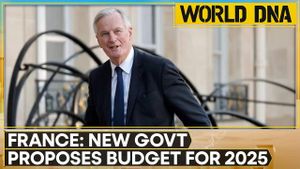Trump Administration's immigration policies have ignited widespread protests across the United States, focusing on the revocation of Temporary Protected Status (TPS) for over 300,000 Venezuelans living here.
The administration's recent moves have been met with outrage from immigrant rights groups, who view them as part of Trump's broader crackdown on immigration initiated during his first term. This policy rollback leaves many vulnerable to deportation, impacting not just Venezuelans but signaling potentially more restrictions on other immigrant groups.
Vice President JD Vance, appearing on CBS’s “Face the Nation,” questioned the motives of the U.S. Conference of Catholic Bishops (USCCB), which issued strong criticisms against the administration's immigration actions, including raids on churches and schools. Vance suggested the bishops might be concerned with federal funding rather than humanitarian issues, stating, "I think the U.S. Conference of Catholic Bishops has, frankly, not been a good partner..." Vance's remarks reflect a contentious relationship between the Trump administration and various faith-based organizations.
Pope Francis also weighed in, calling plans for intensified immigration enforcement "a disgrace," emphasizing the moral responsibility to protect the vulnerable. His comments came during a rare political commentary for the pontiff, underscoring the serious ramifications of Trump’s policies.
Grassroots protests erupted nationwide as citizens and activist groups responded vigorously to the administration's latest moves, with thousands demonstrating from California to Georgia. Activists expressed feelings of urgency and anger over not only TPS revocation but also the broader anti-immigration agenda of the Trump administration. Evelyn Gomez, one of the protest organizers, was surprised by the large turnout, saying, "It's bigger than any of our wildest dreams." These protests have become unified actions calling for humane immigration practices and advocating for the rights of immigrants.
Opponents of the administration's approach, including legal advocates, argue the measures being taken are not only ineffective but also illegal. Ahilan Arulanantham from UCLA’s Center for Immigration Law and Policy stated, "The Trump administration’s attempt to undo the Biden administration’s TPS extension is plainly illegal." This point reflects the growing tension surrounding immigrant protections and suggests lawyers may challenge Trump’s policies legally.
Protests saw participants carrying signs and flags, filled with messages of support for immigrants. One organizer stated, "We thought it was only going to be max 50 people... and it’s honestly amazing," indicating the unexpected power of collective mobilization against perceived injustices. Local protests, particularly noteworthy as they demonstrate the broad concern with immigration policies, were held outside the Richland Holiday Inn and along popular thoroughfares.
Meanwhile, Trump's administration has taken decisive steps to enforce stricter immigration laws, using historical legal frameworks such as the Alien Enemies Act, which could bypass standard judicial processes. This law's reactivation to expedite deportations is controversial, prompting predictions of significant legal battles with civil rights organizations, including the ACLU, which argues the law should not apply to non-combatants seeking refuge.
Chicago’s Cardinal Blase Cupich condemned the administration's approach as harmful and disrespectful, asserting, "This would be an affront to the dignity of all people and communities." With voices from religious leaders like Cupich and the Pope, the outcry against the administration's harsh stance on immigration becomes louder, highlighting moral objections to the treatment of migrants.
Legal experts indicate impending court challenges as immigrant rights groups start organizing against these measures. Lee Gelernt, counsel with the ACLU, stated, "Desperate families coming to our border to seek refuge do not constitute an invasion by a foreign government..." This perspective challenges the framing of immigration as inherently problematic or threatening and lays groundwork for legal arguments to protect immigrant rights.
Moving forward, it remains to be seen how effective the administration's policies will be, as courts grapple with the legality of these actions and growing public dissent presents challenges tireless activists are fighting against. The mass deportation methodologies, along with re-intentionalized enforcement, continue to raise alarms across communities.
The protests are just one indicator of the building sentiment against Trump’s policies. While many immigrants seek safety and opportunity, such measures only add burdens to families already dealing with uncertainty. The need for extensive immigration reform and dialogue surrounding human rights highlights the path forward for many advocates willing to fight for just immigration practices.
Clearly, the division these policies have sparked is significant, and the road to reform involves persistent advocacy, legal struggles, and community engagement. The fight is just beginning, and as advocates rally together, hope remains for more humane policies on immigration.



